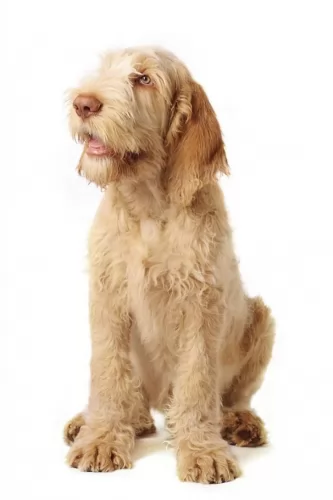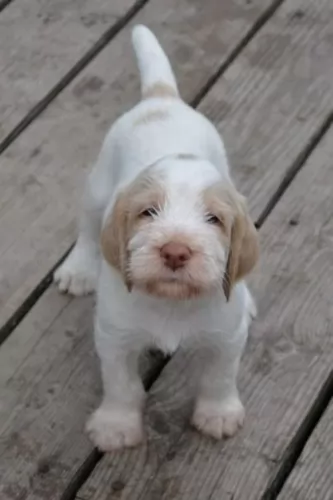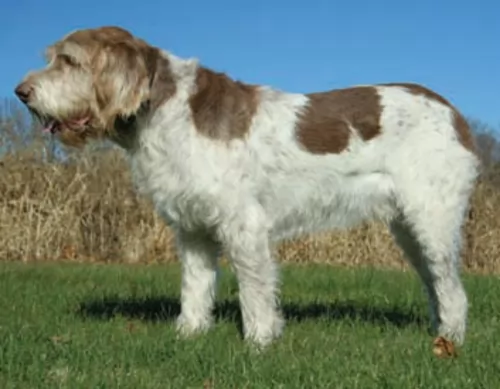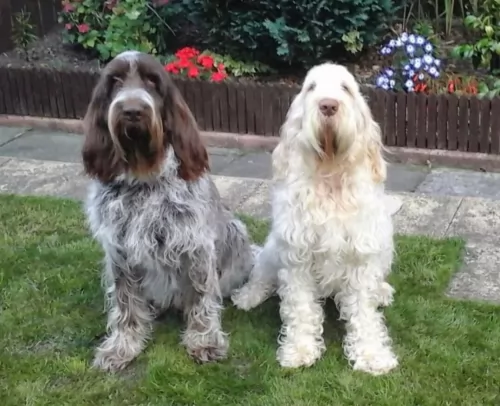 Petzlover
PetzloverBlue Paul Terrier is originated from United Kingdom but Spinone Italiano is originated from Italy. Blue Paul Terrier may grow 14 cm / 5 inches shorter than Spinone Italiano. Blue Paul Terrier may weigh 14 kg / 30 pounds lesser than Spinone Italiano. Blue Paul Terrier may live 3 years more than Spinone Italiano. Both Blue Paul Terrier and Spinone Italiano has almost same litter size. Blue Paul Terrier requires Low Maintenance. But Spinone Italiano requires Moderate Maintenance
Known also as the Scottish Bull Terrier, the Blue Poll or the Blue Poll Bulldog, the Blue Paul Terrier’s origins, as with many unusual dog breeds, are still not known precisely. However they do appear to have been bred with Staffies at some point and appear to have slowly transformed into the Staffie or Pit Bull as we know them today.
There doesn’t seem to be much documentation on the dog’s origins, making many stories of its origins to be looked upon as folklore. It seems as if the dog originated out of Scotland. The name ‘Paul’ is included in the name simply because it is believed that John Paul Jones, who was a sailor, brought the dog to the USA in 1777.
Because this dog has superb fighting skills, it was introduced as part of Staffordshire Bull Terrier breeding in the early 19th century. It is believed that the first dogs came with English immigrants to the United Stated in the middle of the 19th century. At some time, the dog became extinct, but dates of this time can’t be established.
 This Italian breed has an ancient blood line tracing all the back to 500 BC. Originally bred to hunt, he is today a friendly, alert and loyal companion. He is intelligent enough to do any job you give him. The Spinone is thought to be one of the oldest gun dogs ever, but it is not entirely clear that he came from Italy. There are some who think he may have come from somewhere in these European countries – Italy, Greece, France, Celtic Ireland, Spain or Russia. However, most believe the breed came from Italy in the Piedmont area.
This Italian breed has an ancient blood line tracing all the back to 500 BC. Originally bred to hunt, he is today a friendly, alert and loyal companion. He is intelligent enough to do any job you give him. The Spinone is thought to be one of the oldest gun dogs ever, but it is not entirely clear that he came from Italy. There are some who think he may have come from somewhere in these European countries – Italy, Greece, France, Celtic Ireland, Spain or Russia. However, most believe the breed came from Italy in the Piedmont area.
The most common thinking is that he is a descendent of the Spanish Pointer and/or the Russian Setter. One other theory is that setters from Greece were brought to the Roman Empire and crossed with a variety of Italian dog to make the coarse haired Spinone we see today. Then the French put in their claim that the breed is a cross of many French pointers.
The theory that counts might just belong to the Italians who believe the ancestor to the Spinone includes the German Wirehaired Pointer, the Pudelpointer and the Wirehaired Pointer. It was not until the 19th century that the name Spinone was officially given to the breed.
Before that it might have been known as a Spinoso and named after a thorn bus in Italy called the Spino. This bush was so thick and sharp that small prey animals learned to hide under it because the predators could not get through it. The Spinone however was able to fight through the briars with its thick, coarse hair and tough skin.
The breed almost became extinct during the second world war as before and after the hunters in Italy had started to use other breeds for hunting. Breeders also began to cross the Spinone with wire hairs like German Wirehaired Pointer, the Wirehaired Pointing Griffon and the Boulet.
The most popular hunting dog in Italy today is the Bracco Italiano while the Spinone is still used for hunting.
The Blue Paul Terrier was a smooth coated, medium sized dog. His coat was mostly dark blue but this sometimes varied to red or brindle. He was a muscled and well built dog, much like our pit bull terriers. He weighed about 20 to 25kg kg, measuring up to 56cm at the withers. He had a broad chest, large head with small cropped ears and a tail that was set low. He is a dog that always stood strongly on his legs. It seems as if he had an aggressive nature as they were used by local dog fighters.
There is not much information on the temperament of the Blue Paul Terrier, but we can assume, that because he was a Terrier, he would have been full of character and self confidence. Most Terriers don’t actively look for a fight, but will certainly get into a fight if provoked. Aggressive by nature and a fighter, the Blue Paul Terrier possibly had some Staffordshire Bull Terrier in him, so his temperament would be that of a fighter.
He may have been able to live peacefully with children and other dogs and cats in the home, but he would no doubt have had to be raised from a puppy in such a household. Stubborn and headstrong, he would require a firm owner who could take charge of him and training would have been imperative for such a dog.
 The breed is made up of strong, solid and muscled dogs that have an almost square build. His legs are made to travel any terrain and his head is long with an occipital that is pronounced and unique to the Spinone. They are said to have “human appearing eyes”, with a docked tail in countries allowing it and webbed paws.
The breed is made up of strong, solid and muscled dogs that have an almost square build. His legs are made to travel any terrain and his head is long with an occipital that is pronounced and unique to the Spinone. They are said to have “human appearing eyes”, with a docked tail in countries allowing it and webbed paws.
Shorter hair covers their feet, head, legs, muzzle and ears. They have longer hair on their eyebrows and it is stiff, with soft hair on the muzzle and cheeks with a beard and mustache. It is a single coated dog though the coat is rough. They should have skin, lips, nose, and pads in colors that coordinate with their coats. For white dog it is a red-orange color, brown in dogs that are roan colored and dark red-orange in the orange and white colored dog.
Nobody is quite certain what the Blue Paul Terrier was like. He definitely seemed to be a mix of Pit Bull and Staffie – the same compact, muscular build with a look that speaks of confidence and boldness.
Perhaps if the Blue Paul Terrier wasn’t used for fighting, he might well have made a good pet with training and socialization. Nobody really knows. Maybe he was so aggressive that when dog fighting didn’t work out, and it was discovered that he wasn't really pet-material, nobody bothered when the breed went into extinction. That's the thing with Blue Paul Terriers, nobody is really certain about what they were really like.
 3.Adaptability – Young dogs need a lot of attention but they don’t need a lot of space. The young dogs are energetic while the adult dogs are laid-back. They need exercise every day and at least a small back yard.
3.Adaptability – Young dogs need a lot of attention but they don’t need a lot of space. The young dogs are energetic while the adult dogs are laid-back. They need exercise every day and at least a small back yard.
The Blue Paul Terrier Health was generally a healthy dog, but he would no doubt have had the same common dog ailments that most dog breeds have to contend with. All those years ago, when the Blue Paul Terrier was ill, his owner no doubt would have taken him to see the veterinarian for a full screening.
Just like with other dog breeds, he would have been watched for hip dysplasia , ticks and fleas, cataracts and skin infections. It is possible that in those days, owners of the Blue Paul Terrier weren’t aware of how plaque could cause dental problems or gum disease.
 This is an ancient breed with not a lot of documented genetic issues, but it does have one deadly condition.
This is an ancient breed with not a lot of documented genetic issues, but it does have one deadly condition.
• Cerebellar ataxia (CA) is inherited and hits the puppies. Because it is a recessive gene both the mother and father must carry it for the puppy to inherit it. This makes it less likely than it would be otherwise. Puppies with the condition do not live more than a year. Since it is a genetic problem there is now a test for it that identifies carriers at a 95% accuracy rate.
• Like many other large breed dogs, they are susceptible to hip dysplasia. This can cause arthritis and/or lameness. There are now hip replacement surgeries available for this condition.
• Bloat is again common in large dogs and you need to watch for it with the Spinone. It can be deadly if not treated immediately. Let your dog rest quietly after eating. Do not let her exercise or play energetically after eating.
Because these dogs were used in fighting, it is a breed that no doubt would have required plenty of exercise and mental stimulation to keep him fighting fit. No doubt he would have received a high quality food to build up his strength and stamina. Because he was no doubt a high energy dog, his owners would have had to give him nutritious food and ensured fresh, clean water for him.
The Blue Paul Terrier had a short, smooth coat, so they were no doubt low maintenance dogs who received a brush down every now and then to remove his loose hair.
 1Feeding the puppy – feed a high quality dog food for puppies of large breeds. Feed 3-4x day but don’t overfeed or let him exercise after eating even as a puppy.
1Feeding the puppy – feed a high quality dog food for puppies of large breeds. Feed 3-4x day but don’t overfeed or let him exercise after eating even as a puppy.
2.Feeding the adult - feed a high quality dog food for large breeds. Feed 1-2X day but don’t overfeed or let him exercise after eating.
4. Games and Exercises – The Spinone is an active breed, but not a fast dog. In fact, they like to travel at a trot so it becomes a great dog for jogging or running with. They love to jump, track, hunt, hike. They do well with agility, retrieving, flyball, carting, being a therapy dog, a rescue dog and a watchdog.